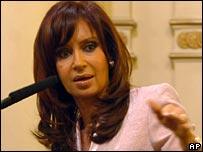Argentina achieves new debt swap
- Published

President Fernandez has promised to clear Argentina's debts
Argentina says it has achieved a debt swap that moves it a step closer to resolving the difficulties caused by its huge default eight years ago.
Creditors agreed to exchange two thirds of its outstanding bad debt for new bonds, in a deal worth around $12bn.
The deal means Argentina has now settled 92% of the bad debt left from its sovereign default in 2001.
The government hopes it will now be able to raise new international loans at better interest rates.
"This is a very important step that gets rid of what has been the most severe restriction on the Argentine economy in recent decades", President Cristina Fernandez de Kirchner said.
"Vulture funds"
About $6bn in Argentine bonds are still held by "hold-out" creditors who rejected the swap and an earlier restructuring in 2005.
They are demanding full repayment, and analysts say lawsuits could still limit Argentina's ability to raise money on international markets.
The government has condemned the outstanding creditors as "vulture funds" - a term for investors that buy sovereign debt at a discount and sue to recover its full value.
Latin America's third-biggest economy has been trying to rebuild its reputation with international investors, which was shattered by the 2001 sovereign default.
Argentina defaulted on around $95bn of bonds, a record amount at the time, but its economy has since recovered.
President Cristina Fernandez's predecessor, her husband Nestor Kirchner, restructured most of the debt, and repaid money borrowed from the International Monetary Fund.